AFL 25: The eight contentious issues in Glenn McFarlane and Jon Ralph’s team of the century
Jon Ralph and Glenn McFarlane have named their AFL team of the century so far – and debate is already raging. What do you think? Have your say on eight of the most contentious issues.
AFL
Don't miss out on the headlines from AFL. Followed categories will be added to My News.
Cyril or Eddie? Selwood or Mitchell? Which Riewoldt?
When it comes to picking the best team of the past 25 years, it is almost an infinite number of combinations you can come up with to pick 23 players.
From prioritising longevity over impact, whether there’s a preference for premierships or Brownlows, everyone who weighed in on the team had a different opinion.
Another point of contention involved picking the strongest possible team, a side that is perfectly balanced with talls and smalls, or playing versatile stars in certain positions.
So what were the biggest debates that had two of the AFL media’s biggest names stomping their feet and shaking their fists, trying to convince the other of the selection of their favourite player?
And which decision did they agonise over together, trying to find a hotly-contested position to squeeze them into?
Break down Glenn McFarlane and Jon Ralph’s most contentious talking points surrounding their team of the century so far.
1. WHO WAS THE STIFFEST PLAYER TO MISS OUT?
Nat Fyfe, Patrick Cripps and Brent Harvey are among the most stiff to miss out.
Fyfe had five incredible years and his best is arguably better than some in this team but when you need to be judged as a top-10 midfielder across your career, you can’t get much wrong.
For all of his greatness in the 2014-2019 period – two Brownlows, two Leigh Matthews trophies – his career is littered with injury, his kicking let him down at times and he doesn’t have a huge finals legacy even despite securing a single Norm Smith vote amid a solid 2013 finals campaign.
Call it harsh, but one Hawks premiership star made this point – Luke Hodge made more of a positive impact on the players around him than any player he had witnessed, but could the same case be made for Fyfe?
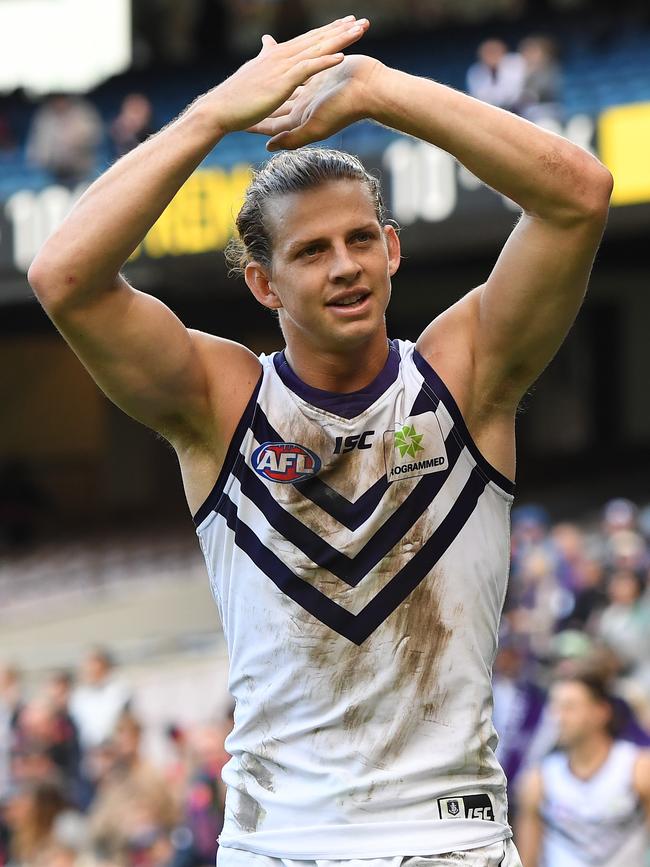
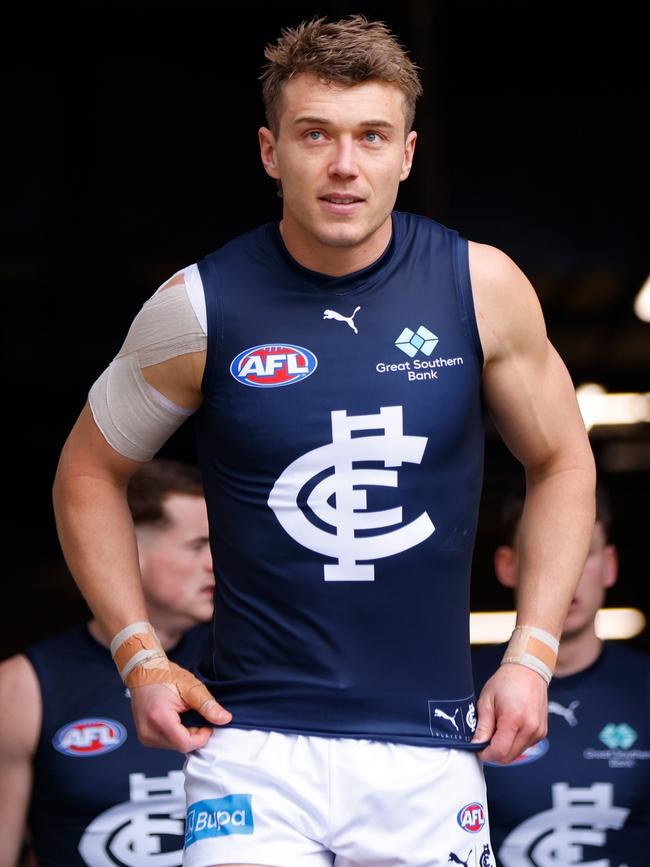
It is not to downgrade him as a player, simply to explain why the likes of Lachie Neale and Marcus Bontempelli steal the march on him.
Bontempelli might be the greatest Bulldog of all time and could easily have multiple Brownlows and a Norm Smith Medal with a hint of luck (he has none of either).
Neale has huge admirers including Leigh Matthews for this reason.
He has a stunning record of consistency that includes him winning six of his past nine club championships.
In the other three years when he didn’t win, he finished second at Fremantle in 2017, battled back and ankle injuries at Brisbane in 2021 (only 17 games) and won the 2023 Brownlow Medal.
Many would have had Cripps as a walk-up start in their side.
But to be frank he could do with a Dangerfield-style legacy flag, and it might yet come.
For all his brilliance he has played in only four finals and was quiet in two of them, even if he has carried the Blues on his back like Riewoldt and Pavlich before him.
It kills us not to have Brent Harvey in this team, who might well have been the ultimate super sub for this team.
He has it all – the AFL games record, durability, sheer consistency, matchwinning glory, yet Martin and Dangerfield squeezed him out of the forward line that also needs a pure crumber like Rioli.
2. HOW CAN YOU IGNORE TOM HAWKINS AND JACK RIEWOLDT GIVEN THEY SHARE SIX FLAGS AND FOUR COLEMAN MEDALS BETWEEN THEM?
The pair are impossible to split – Riewoldt with 787 goals and 347 games, Hawkins with 796 goals and 359 games.
But having spoken to many of the game’s great forwards, they franked our opinion that the four best key forwards of the era are Franklin, Nick Riewoldt, Matthew Lloyd and Matthew Pavlich.
Lloyd is the last of the great pure full forwards, and across the first five seasons of this era kicked 109, 105, 47, 93 and 96 goals.
Only Fraser Gehrig and Lance Franklin have also kicked 100 goals in this century (Fev just missed out with 99).
Nick Riewoldt cannot be overlooked after six best and fairests and five All-Australians, even if the Riewoldt clan could argue late into the night whether Jack’s three flags and three Colemans draws him closer to Nick’s brilliance.
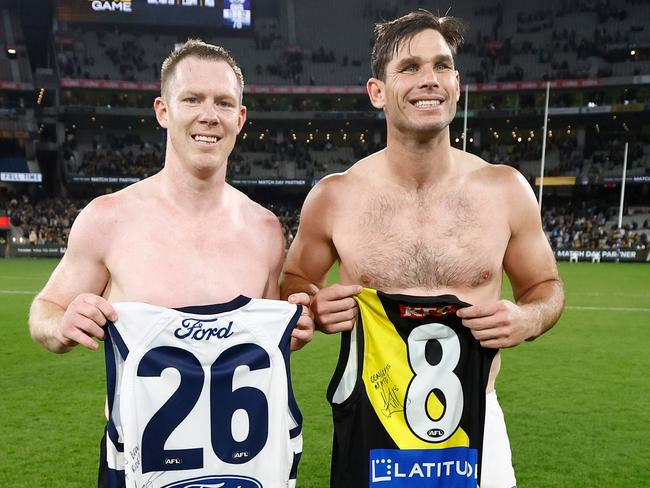
Every time we considered whether Hawkins or Jack Riewoldt should leap over Pavlich – call it recency bias or their premiership feats – we came back to his unimpeachable record.
Six All-Australian nods, six best-and-fairests, all 353 career games played in this period, his soaring leadership of an at-times mediocre team, 15 finals including an absorbing Grand Final battle with Brian Lake (he kicked three, Lake won the Norm Smith).
No one oozes more charisma or presence than Jonathan Brown (three flags, two All-Australians, three best-and-fairests, a Coleman) but along with Port Adelaide premiership captain Warren Tredrea, Matthew Richardson, Eagles star Josh Kennedy and Barry Hall, he too narrowly missed out.
3. WAS ANDREW McLEOD A LITTLE LUCKY?
Maybe, but for who? Chris Johnson could easily have slotted in as a pure back pocket but you cannot have a team of the century without a running half back.
Shaun Burgoyne had a million big finals moments but only one All-Australian and not at Hawthorn.
Sam Mitchell won one of his All Australian jumpers at half back but he hated playing there and it would be a cheat to slot him into that position with McLeod screaming out to be picked.
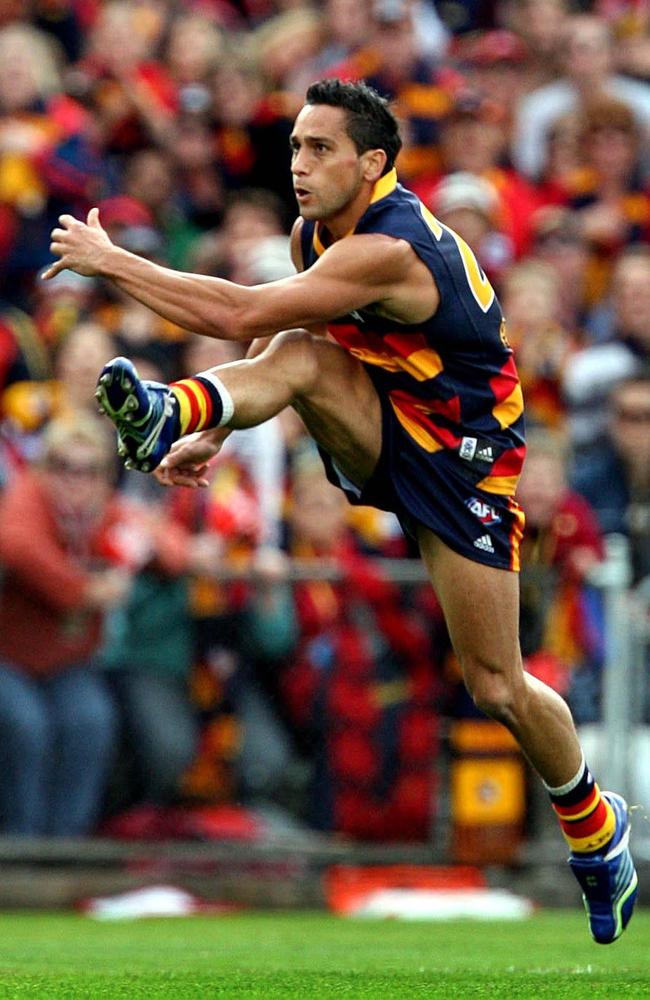
In a sense, he was almost the prototype for the modern running half back, where coaches elected to put one of their most damaging players as the springboard from defence to attack.
One of his former teammates told us he changed the game and while his two Norm Smith Medals came last century, his impact saw him selected in four AA sides in the 2000s, including two at half back and one as skipper.
A list of the All Australian half backs this century shows a host of stars – Andrew McKay, Simon Goodwin, Jack Sinclair, Dan Houston Shannon Hurn and Bob Murphy were among the multiple All-Australians.
But McLeod gets the nod.
4. BUCKLEY, HIRD AND VOSS. WHY DID TWO OF THESE GREATS MISS OUT?
Every team needs a criteria and in sitting down to select the best side of the 2000s, we settled on 150 games as a minimum qualification, which equates to at least seven seasons.
While Voss retired the year before Hird and Buckley, he cleared that threshold with his durability meaning he played at least 21 games per year in his last eight seasons, including seven in the 2000s.
In that time, he was a three-time premiership skipper, was bloody stiff not to take Nathan Buckley’s Norm Smith off him late in the 2002 Grand Final, and was twice All-Australian captain.
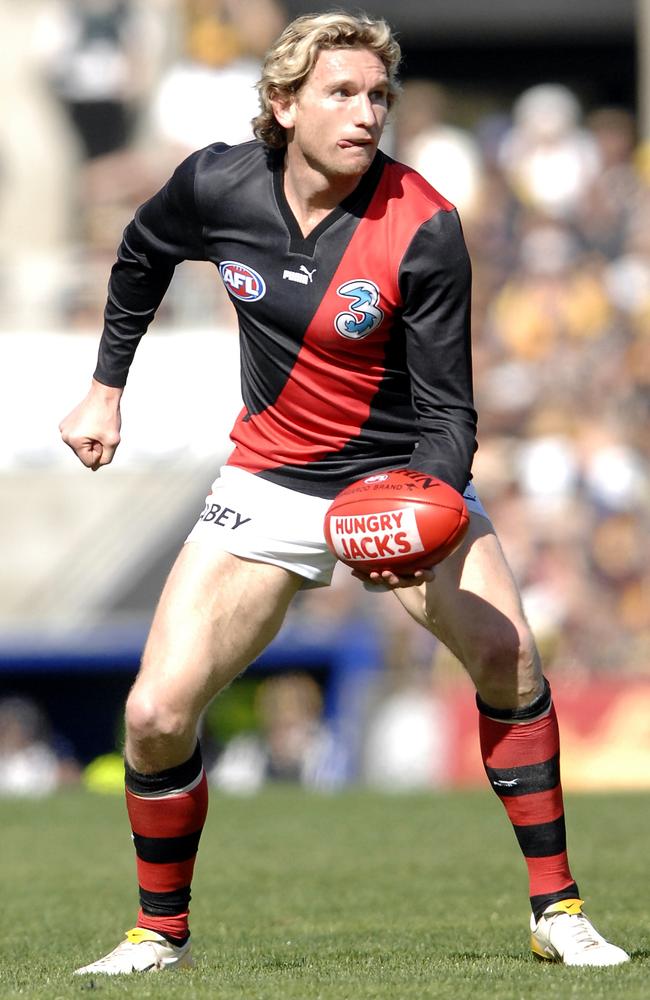
He played 161 games in his seven seasons in the 2000s.
In contrast, injuries limited Buckley and Hird in the final years of their stellar careers, which clearly wasn’t their fault. But it left them both marginally short of our 150-game criteria.
Hird played 143 games in that period; Buckley played 138, before ongoing hamstring issues brought an early retirement.
Many of the other mids we stacked them up against had played over 300 games, so as outstanding as they were (and they really were), both Bucks and Hird missed out on the games eligibility.
5. DID GEELONG GET LUCKY GIVEN THEIR WEIGHT OF NUMBERS IN THIS SIDE?
Brisbane might have had the best pound-for-pound dynasty team in this era but had only Voss and Simon Black in this side, while Richmond had only Martin and Rance, despite three flags in four years.
Geelong’s Corey Enright, Matthew Scarlett, Gary Ablett, Joel Selwood and Patrick Dangerfield all make it, with Tom Hawkins, Jimmy Bartel and Steve Johnson arguably stiff.
Yet the Cats’ era arguably runs across more than 15 years _ the 2004 side played in a preliminary final and this club has missed finals only three times since in 21 seasons.
Brisbane has a host of players who just miss _ Chris Johnson is one of the great small back pockets, but narrowly misses out in defence for Enright, Hodge and McLeod.
Jason Akermanis (a Brownlow, a Norm Smith, three All-Australians, three flags) will be in many teams, while others will believe Brown’s three flags and his undoubted aura of greatness puts him ahead of Pavlich.
6. IS IT THE SAME OLD VICTORIAN BIAS TO IGNORE THE CLAIMS OF DEAN COX, BEN COUSINS AND MARK RICCIUTO?
We’d like to think not! We loved watching all three of them.
If Simon Madden showed Dean Cox the way as a prototypical modern ruckman, the Eagles champion perfected the art form.
It would take something indescribable to beat him as the best ruckman of the past 25 years.
Max Gawn and Dean Cox are nearly impossible to split on numbers alone.
Cox is the better kick, Gawn the better contested mark (2.05 to 0.85 a game). Cox averages 22.8 disposals, Gawn 15.79.
Cox averages 0.58 goals, Gawn 0.49. Cox averages 2.8 clearances, Gawn 3.56. Cox ran third in 2006 Norm Smith Medal voting, Gawn’s five preliminary final goals set up the 2021 premiership campaign.
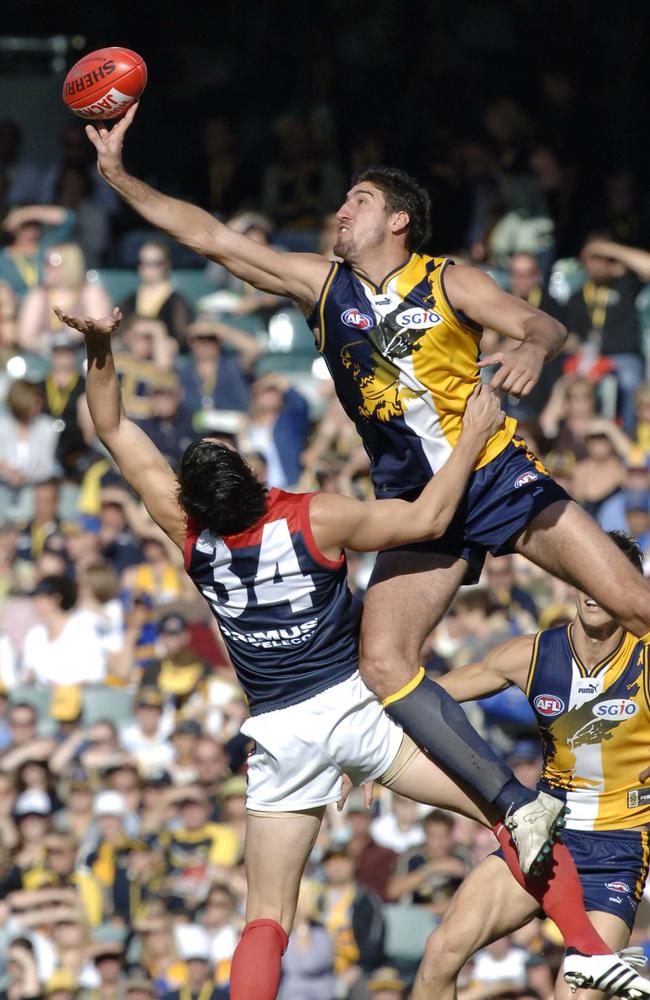
In the end, Gawn wins through his role as a premiership captain with one extra All Australian jumper (seven to six) and one extra best-and-fairest (two to one).
Cousins (four All-Australians, four best-and-fairests) is just incredibly stiff like Sam Mitchell, Fyfe, five-time All Australian Brad Johnson, Akermanis and many more.
He turned 28 in the 2006 premiership year but amid his ice addiction would play only seven more games at West Coast then after his deregistration those two years at Richmond.
In an era when so many rivals played well into his 30s, their resumes beat him for honours and longevity.
And Ricciuto has every reason to think he is stiff. What a great player he was, as the All-Australian judges showed with his eight nods, including five in the 2000s.
7. WHY DID SIMON BLACK WIN THAT LAST MIDFIELD SPOT?
Beauty is in the eye of the beholder. But consider his record in that run of three premierships across four Grand Finals in a career that saw him play 291 of his 322 games in this eligibility period.
He was All-Australian in 2001, 2002 and 2004, he was the Brownlow Medallist of 2003, he won the Brisbane best-and-fairest in 2001 and 2002.
In a star-studded side that includes Akermanis, Justin Leppitsch, Mal Michael, Nigel Lappin, Alastair Lynch, Chris Johnson and so many more, those who know best believe he was second in influence only to Voss.
8. DID THE PURE HALF FORWARDS AND SMALL FORWARDS GET SCREWED OVER?
Maybe, with only Cyril Rioli chosen as a small or medium forward who played exclusively small forward.
The decision to play Dangerfield and Martin in this front six meant less spots for five players with excellent resumes.
Eddie Betts (640 goals), Brad Johnson (558 goals), Stephen Milne (574 goals), Brent Harvey (518 goals), Steve Johnson (516 goals) all missed, as did Luke Breust (549).
Harvey’s heroics forward and in the midfield were legendary.
Johnson created mayhem on Grand Final day – once on a busted knee, once with four goals after predicting his Norm Smith Medal heroics – but had few very high best-and-fairest finishes in a stacked Cats side.
Milne, Breust and Betts were masters of their craft as pure crumbers, while 182cm mid-forward Johnson redefined forward play as a leading target who often carried his forward line.
You would be happy to have any of them in this forward line but Rioli edges ahead for his tackle pressure, sheer brilliance and finals performances.
Originally published as AFL 25: The eight contentious issues in Glenn McFarlane and Jon Ralph’s team of the century


